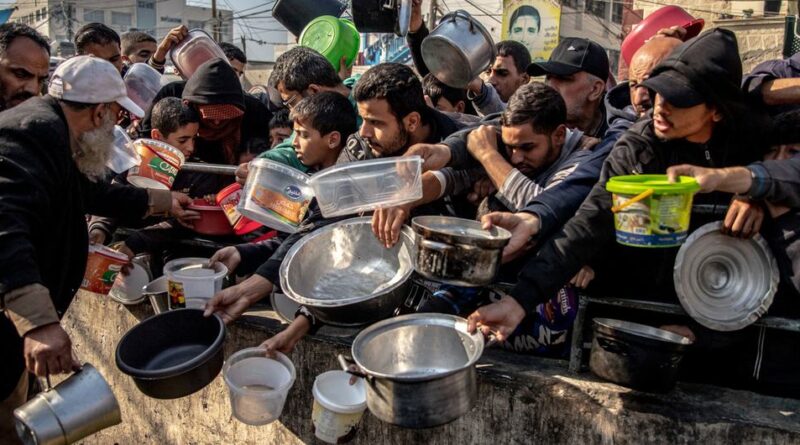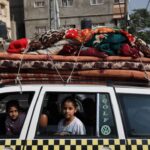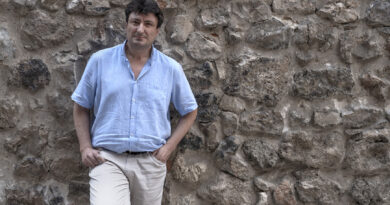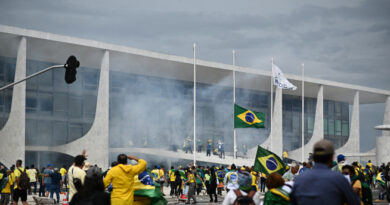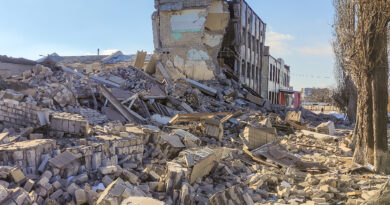Let them eat dirt
The final phase of Israel's genocide in Gaza, an orchestrated mass famine, has begun. The international community has no intention of stopping it.
CHRIS HEDGES
There was never any chance that the israeli government accept a pause in fighting proposed by Secretary of State Antony Blinken, much less a ceasefire. Israel is about to deliver the final blow in its war against the Palestinians of Gaza: mass starvation. When Israeli leaders use the term "absolute victory," they mean total decimation, total elimination. In 1942, the Nazis systematically starved the 500.000 men, women and children of the Warsaw Ghetto. This is a figure that Israel aims to surpass.
Israel and its main sponsor, the United States, trying to close the United Nations agency for Palestine Refugees (UNRWA), which provides food and aid to Gaza, are not only committing a war crime, they are blatantly defying the International Court of Justice (ICJ). The court found plausible the accusations of genocide presented by South Africa, which included statements and facts collected by UNRWA. He ordered Israel to abide by six provisional measures to prevent genocide and alleviate the humanitarian catastrophe. The fourth interim measure calls on Israel to ensure immediate and effective measures to provide humanitarian aid and essential services in Gaza.
UNRWA's reporting on conditions in Gaza, which I covered as a reporter for seven years, and its documentation of indiscriminate Israeli attacks illustrate that, as UNRWA said, "unilaterally declared 'safe zones' are not safe at all. Nowhere in Gaza is safe.
UNRWA's role in documenting the genocide, as well as providing food and aid to Palestinians, infuriates the Israeli government. Prime Minister Benjamin Netanyahu accused UNRWA following the ruling of providing false information to the ICJ. Israel, which had already targeted it for decades, decided that the agency, which helps 5,9 million Palestinian refugees across the Middle East with clinics, schools and food, had to be eliminated. Israel's destruction of UNRWA responds to both a political and material objective.
The Israeli accusations without evidence against UNRWA that a dozen of the 13.000 employees They had ties to those who carried out the attacks in Israel on October 7, in which some 1.200 Israelis died, they achieved their objective. It led 16 major donors, including the United States, United Kingdom, Germany, Italy, Netherlands, Austria, Switzerland, Finland, Australia, Canada, Sweden, Estonia and Japan, to suspend financial aid to the aid agency from which Almost all Palestinians depend on Gaza for food. Israel has killed 152 UNRWA workers and has damaged 147 of its facilities since October 7. Israel has also bombed trucks of UNRWA aid.
More than 27.708 Palestinians have died in Gaza, Some 67.000 have been injured and at least 7.000 are missing, probably dead and buried under rubble.
More than half a million Palestinians - one in four - die of hunger in Gaza, according to the UN. Hunger will soon be omnipresent. Palestinians in Gaza, of whom at least 1,9 million have been internally displaced, not only lack sufficient food, but also clean water, shelter and medicine. There are few fruits and vegetables. There is little flour to make bread. The pasta, along with the meat, cheese and eggs, are gone. Black market prices for dry goods such as lentils and beans have increased 25-fold compared to pre-war prices. A sack of flour on the black market has risen from 8 to 200 dollars. Gaza's health system, of which only three of the 36 hospitals remain that are partially functioning, has largely collapsed. About 1,3 million displaced Palestinians live on the streets of the southern city of Rafah, which Israel designated a "safe zone," but that has started to bomb. Families shiver in the winter rains under flimsy tarps amid puddles of raw sewage. An estimated 90% of Gaza's 2,3 million residents have been expelled from their homes.
"There is no case since World War II in which an entire population has been reduced to extreme hunger and destitution so quickly," writes Alex de Waal, executive director of the World Peace Foundation at Tufts University and author of “Mass Starvation: The History and Future of Famine,” in The Guardian. "And there is no case in which the international obligation to stop it has been so clear."
The United States, previously the largest contributor to UNRWA, provided $422 million to the agency in 2023. The funding disruption ensures that UNRWA food deliveries, already in short supply due to Israel's blockades, They will largely stop at the end of February or beginning of March.
Israel has given the Palestinians in Gaza two options. Leave or die.
I covered the Sudan famine in 1988, which claimed 250.000 lives. I have marks on my lungs, scars from being among hundreds of Sudanese who died of tuberculosis. I was strong and healthy and fought the contagion. They were weak and emaciated and they did not do it. The international community, as in Gaza, did little to intervene.
The precursor to starvation - malnutrition - already affects the majority of Palestinians in Gaza. Those who are starving lack enough calories to sustain themselves. Desperate, they begin to eat forage, grass, leaves, insects, rodents and even dirt. They suffer from diarrhea and respiratory infections. They tear off small pieces of food, often spoiled, and ration it.
Soon, lacking enough iron to produce hemoglobin, a protein in red blood cells that carries oxygen from the lungs to the body, and myoglobin, a protein that provides oxygen to muscles, coupled with a lack of vitamin B1, they become anemic. . The body feeds on itself. Tissues and muscles wear out. It is impossible to regulate body temperature. The kidneys become blocked. The immune system collapses. Vital organs (brain, heart, lungs, ovaries and testicles) atrophy. Blood circulation slows down. Blood volume decreases. Infectious diseases such as typhoid fever, tuberculosis and cholera become an epidemic that kills thousands of people.
It's impossible to concentrate. Emaciated victims succumb to mental and emotional withdrawal and apathy. They don't want to be touched or moved. The heart muscle weakens. The victims, even at rest, are practically in a state of heart failure. The wounds do not heal. Vision deteriorates with cataracts, even among young people. Finally, ravaged by convulsions and hallucinations, the heart stops. This process can take up to 40 days for an adult. Children, the elderly and the sick die more quickly.
I saw hundreds of skeletal figures, ghosts of human beings, moving desolately at a glacial pace across the arid Sudanese landscape. Hyenas, accustomed to eating human flesh, carried away small children. I stopped at clusters of bleached human bones on the outskirts of villages where dozens of people, too weak to walk, had lain down in groups and never gotten up. Many were the remains of entire families.
In the abandoned village of Maya Abun, bats hung from the rafters of the Italian mission church, which had been destroyed. The streets were covered with tufts of grass. The dirt landing strip was flanked by hundreds of human bones, skulls and remains of iron bracelets, colored beads, baskets and shreds of clothing. The palm trees had been cut in half. People had eaten the leaves and pulp inside. There was a rumor that the food would arrive by plane. People had walked for days to the landing strip. They waited and waited. No plane arrived. Nobody buried the dead.
Now, from a distance, I observe what happens in another land, in another time. I know the indifference that condemned the Sudanese, mostly Dinka, and that today condemns the Palestinians. The poor, especially when they are of color, do not count. You can kill them like flies. The famine in Gaza is not a natural disaster. It is Israel's master plan.
There will be academics and historians who will write about this genocide, falsely believing that we can learn from the past, that we are different, that history can prevent us from being, once again, barbarians. They will hold academic conferences. They will say "Never again!" They will praise themselves for being more humane and civilized. But when the time comes to speak out with each new genocide, fearful of losing their status or academic positions, they will scurry like rats to their burrows. The history of humanity is one long atrocity for the poor and vulnerable of the world. Gaza is another chapter.
Chris Hedges He is an American journalist, winner of the Pulitzer Prize. He was an international correspondent for 15 years for the New York Times and headed that newspaper's Middle East and Balkan bureaus. Currently, he hosts the weekly internet television program The Chris Hedges Report. Your work can be followed here.

